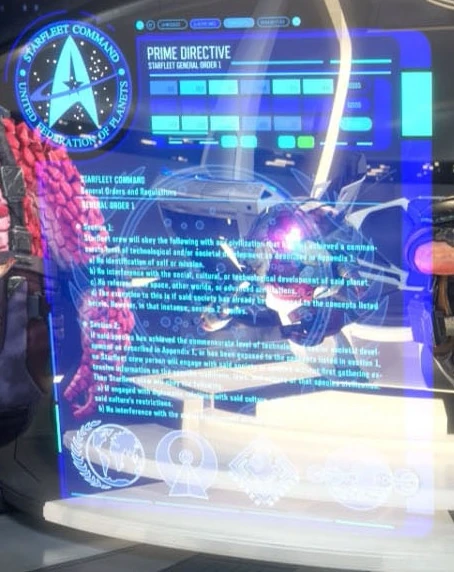And, not for anything. Shatner's passionate reading of the US Constitution, along with his "they must apply to everyone! Or they mean nothing!" is a timeless message that should speak to every human on this planet, no matter where you hail from.
No question about it, Kirk gave a stirring recitation of the Preamble.
And Kirk's "they must apply to everyone or they mean nothing!" are good words.
But if Chief Cloud knew any better, he could have replied, "That's rich, coming from you. You arrest Tracey for violating the Prime Directive, yet here you are, right now, violating the Prime Directive with impunity."
I enjoyed "The Omega Glory". But I am going to sound like a nitpicking party pooper on this point, that I'm going to make.
So, Kirk is a stickler for adhering to the Prime Directive when it comes to Tracey. But when it comes to his own PD violation, rules be damned.
At the end, even Spock knew there was something amiss with Kirk's actions. That's why Spock asked Kirk, "there's no question about his guilt, Captain, but does our involvement here also constitute a violation of the Prime Directive?"
Kirk didn't deny that he violated the PD. He justified it by unilaterally carving out an exception to the rule for himself (that's not new). Talk about double standard and hypocrisy.
What about those high minded words "they must apply to everyone or they mean nothing"? The PD applies to Tracey, but not to Kirk? The PD means nothing then.
I get that the context of Tracey's PD violation and Kirk's violation are different. But a PD violation is a PD violation. I didn't make the rules. Those are their rules, Starfleet rules, as Kirk and Spock described them, "regulations are quite harsh."
As I wrote earlier, I enjoy watching "The Omega Glory". Shatner/Kirk gave an excellent memorable performance.
It is just in recent viewings, that Kirk's double standard had become glaringly clear. I wouldn't blame Chief Cloud if he was confused by all this double standard.



